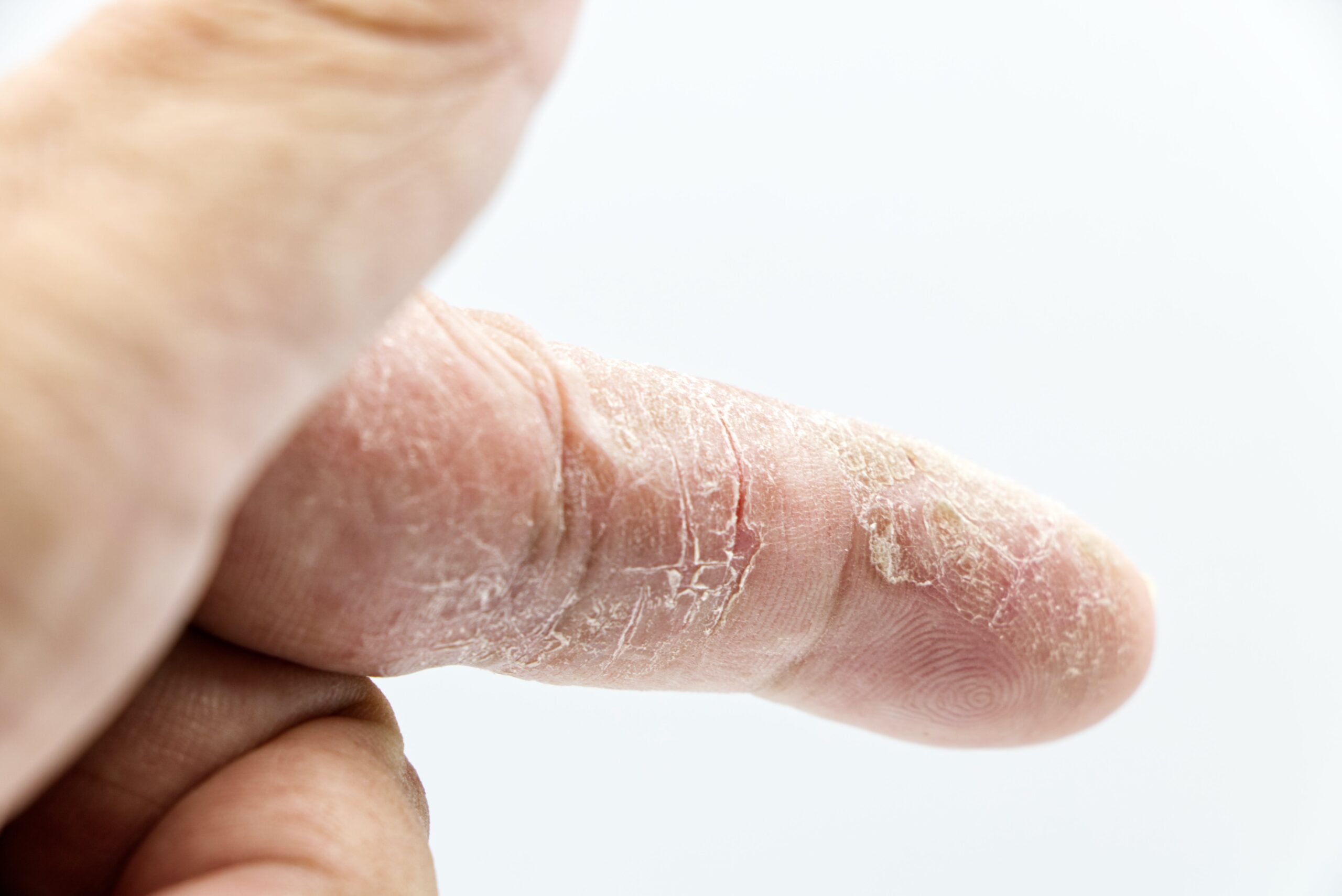Are you suffering with dry skin?
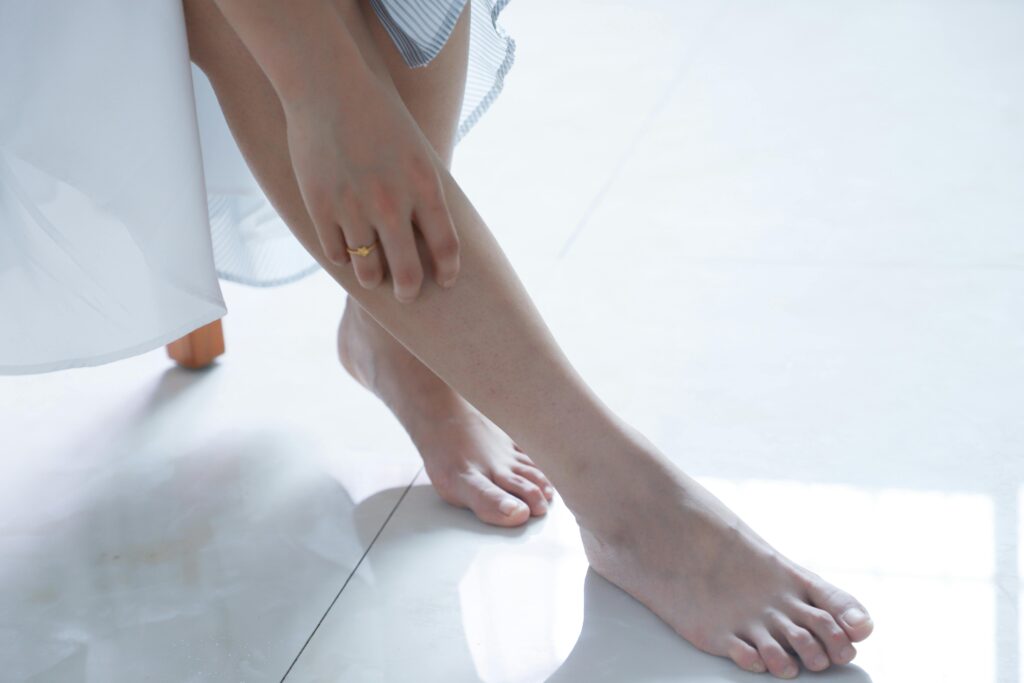
If so, don’t worry! you’re not alone. Dry skin is a common condition that affects many people worldwide. We are here to advise you on some vital information about dry skin. In this article, we will discuss 12 common questions about dry or sensitive skin. Let’s Explore the entire article below.

- WHAT DOES DRY SKIN LOOK LIKE?
- DOES DRY SKIN COME IN VARIOUS TYPES?
- WHICH AREAS OF THE BODY ARE MORE PRONE TO EXPERIENCING DRY SKIN?
- WHY IS MOISTURE SO CRUCIAL FOR THE SKIN?
- WHAT ARE THE COMMON CAUSES OF DRY SKIN?
- DOES RELYING ON SUNSCREEN ALONE SUFFICE TO MAINTAIN SKIN HYDRATION?
- HOW TO TACKLE SKIN THAT IS PEELING AND SUNBURNED DUE TO DRYNESS?
- DO RATIATORS AND HEATING SYSTEMS PLAY A ROLE IN CAUSING DRY SKIN?
- WHAT CONSTITUTES EFFECTIVE CARE FOR DRY SKIN?
- DOES DRINKING WATER HELP DRY SKIN?
- WHAT TYPES OF PRODUCTS SHOULD I USE FOR DRY SKIN?
- HOW CAN I PRESERVE THE NATURAL MOISTURE OF MY SKIN?
Our Top Pick Products for Dry Skin-
1. WHAT DOES DRY SKIN LOOK LIKE?

Dry skin typically appears dull, rough, and flaky. It may feel tight, itchy, or even show signs of redness. Fine lines and cracks may become more noticeable, especially in areas prone to dryness such as elbows and knees. In severe cases, dry skin can lead to inflammation and discomfort. Proper hydration, moisturization, and a consistent skincare routine are essential to address and prevent dry skin.
2. DOES DRY SKIN COME IN VARIOUS TYPES?
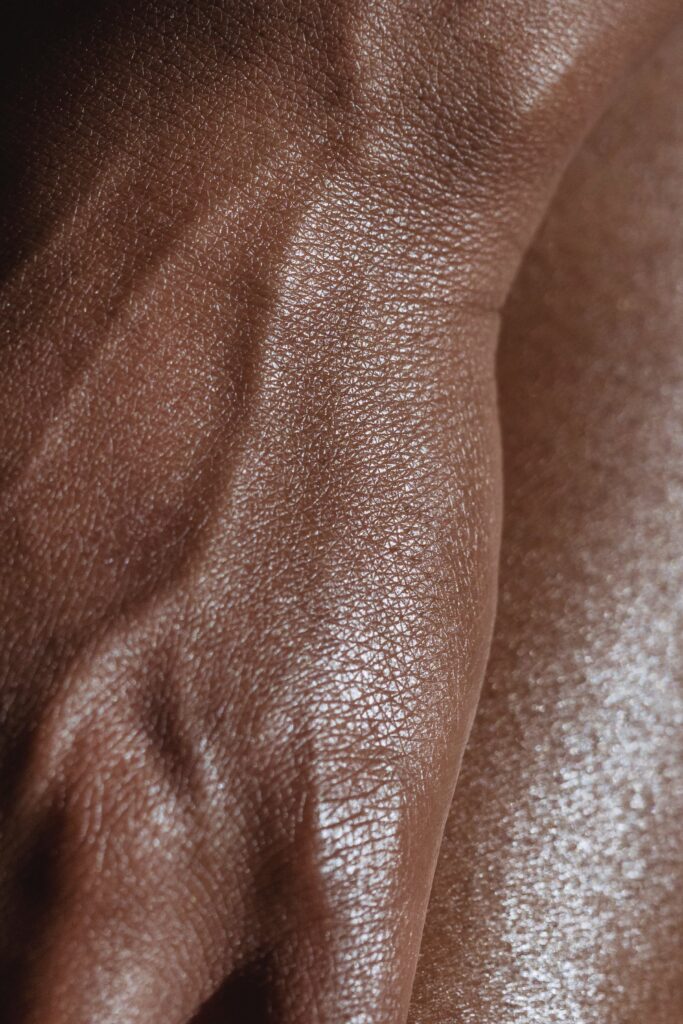
Yes, there are different types of dry skin, and they can vary based on their underlying causes and specific characteristics. Here are a few common types:
Normal Dry Skin:
- This type of dry skin is often a result of environmental factors such as cold weather, low humidity, or excessive sun exposure. It can be temporary and can be managed with proper skincare.
Dehydrated Skin:
- Dehydration is a condition where the skin lacks water, leading to a feeling of tightness and discomfort. It is essential to distinguish between dryness and dehydration, as dehydrated skin requires increased water intake along with topical moisturization.
Aged or Mature Skin:
- Aging can lead to a natural decline in oil production, resulting in drier skin. Fine lines and wrinkles may become more apparent, and a skincare routine targeting mature skin is often recommended.
Sensitive Dry Skin:
- Individuals with sensitive skin may experience dryness accompanied by redness, irritation, or itching. Harsh skincare products, allergens, or certain ingredients can trigger these reactions.
Medical Conditions:
- Some medical conditions, such as eczema (dermatitis) and psoriasis, can cause chronic dry skin. These conditions often require specialized treatment and care from a healthcare professional.
Medication-Induced Dry Skin:
- Certain medications, including those for acne or allergies, may list dry skin as a side effect. If dryness persists after starting a new medication, consulting with a healthcare provider is advisable.
Understanding the specific type of dry skin you may be experiencing is crucial for effective treatment. It allows for the implementation of targeted skincare routines and lifestyle changes to address the underlying causes and promote healthier, well-hydrated skin. If dry skin persists or is accompanied by severe symptoms, consulting with a dermatologist or healthcare professional is recommended for a proper diagnosis and personalized treatment plan.
3. WHICH AREAS OF THE BODY ARE MORE PRONE TO EXPERIENCING DRY SKIN?
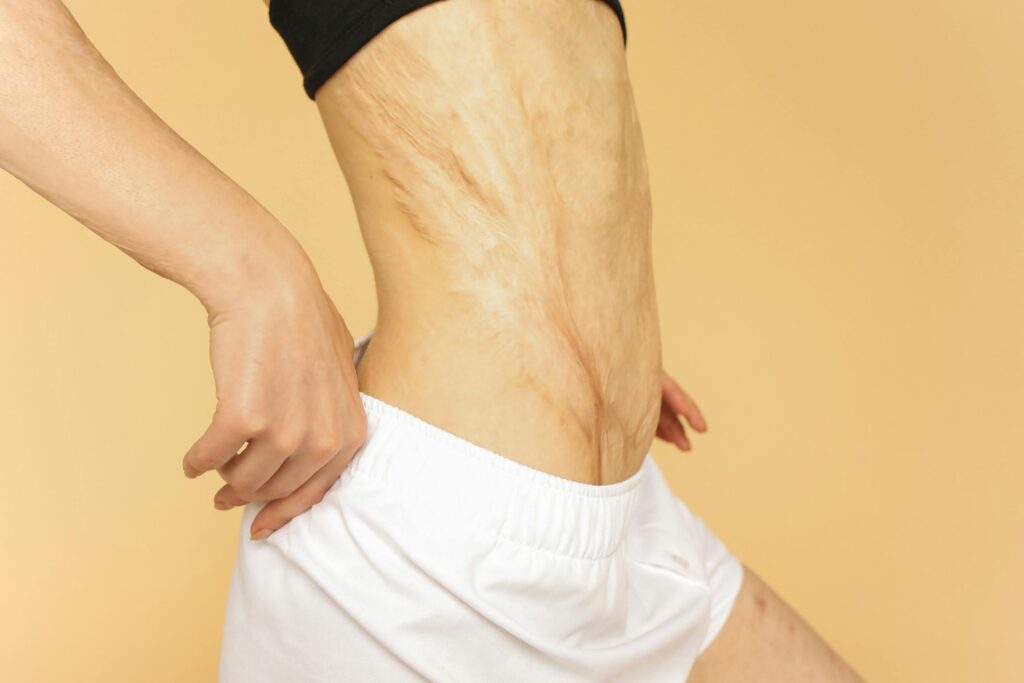
Certain areas of the body are more prone to dry skin due to factors such as fewer oil glands, increased exposure to environmental stressors, or frequent contact with water and harsh soaps. Here are some common areas:
Hands:
- Constant exposure to water, soaps, and other irritants, coupled with frequent washing, can make the skin on the hands prone to dryness.
Feet:
- The skin on the feet is often thicker and can be prone to dryness, especially the heels. Factors like wearing open shoes and exposure to friction contribute to this.
Elbows and Knees:
- These areas have less oil glands, making them susceptible to dryness and roughness. Regular moisturization is essential to keep the skin supple.
Face:
- The facial skin is delicate and exposed to various environmental factors. Dry skin on the face can result from harsh weather, skincare products, or underlying skin conditions.
Shins:
- Like elbows and knees, the shins have fewer oil glands, making them prone to dryness. Dry skin on the shins can be exacerbated by shaving or exposure to harsh weather.
Arms:
- The upper arms, particularly the back, may experience dryness, often exacerbated by factors like sun exposure and inadequate moisturization.
Lower Legs:
- The lower legs, including the calves, may be prone to dry skin due to less oil production and exposure to environmental stressors.
Abdomen:
- The skin on the abdomen may become dry, especially if exposed to hot water during showers or if skincare practices are not consistent.
It’s essential to tailor your skincare routine to address the specific needs of these prone areas. Regular moisturization, avoiding harsh products, and protecting the skin from extreme environmental conditions can help maintain skin health and prevent dryness in these susceptible areas. If dryness persists or is severe, consulting with a dermatologist is advisable for personalized advice and treatment.
4. WHY IS MOISTURE SO CRUCIAL FOR THE SKIN?
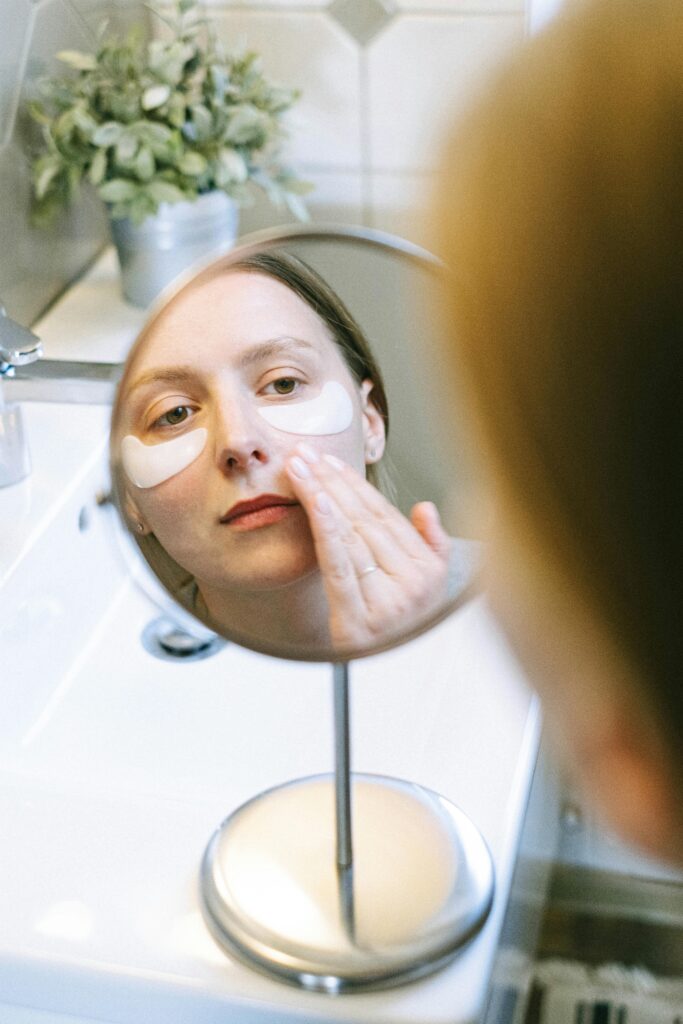
Moisture is crucial for the skin’s health and well-being, playing a vital role in maintaining its function and appearance. Here are several reasons why moisture is essential for the skin:
Barrier Function:
- The skin acts as a protective barrier, preventing external irritants, allergens, and pathogens from entering the body. Adequate moisture helps maintain the integrity of this barrier, ensuring it remains effective in safeguarding against potential threats.
Preventing Dryness:
- Moisture is fundamental in preventing dry skin. Well-hydrated skin feels supple, smooth, and comfortable. Dry skin, on the other hand, is more prone to irritation, itching, and the development of fine lines and wrinkles.
Regulating Temperature:
- Proper skin hydration helps regulate body temperature. Sweating is the body’s natural way of cooling down, and moist skin is more efficient in releasing heat through evaporation.
Enhancing Elasticity:
- Moisturized skin is more elastic and resilient. It maintains its ability to stretch and bounce back, reducing the likelihood of developing sagging or premature aging signs such as wrinkles.
Promoting Healing:
- Moisture is crucial for the skin’s natural healing process. Injuries, wounds, or irritations heal more effectively in a well-hydrated environment, minimizing the risk of scarring and promoting healthy tissue regeneration.
Supporting Collagen Production:
- Collagen, a protein that provides structure and firmness to the skin, requires proper hydration for its production. Well-moisturized skin contributes to the synthesis of collagen, promoting a youthful and resilient complexion.
Preventing Irritation:
- Dry skin is more susceptible to irritation and inflammation. Moisture helps soothe the skin, reducing redness, itchiness, and discomfort associated with various skin conditions.
Maintaining pH Balance:
- The skin has a slightly acidic pH that helps defend against harmful microorganisms. Proper moisture levels assist in maintaining this pH balance, supporting the skin’s natural defenses.
Improving Absorption of Skincare Products:
- Moisturized skin absorbs skincare products more effectively. When the skin is adequately hydrated, it can better absorb the benefits of moisturizers, serums, and other topical treatments.
Boosting Radiance:
- Hydrated skin reflects light more effectively, contributing to a radiant and healthy complexion. Moisture helps create a natural glow and diminishes the appearance of dullness or dry patches.
To maintain optimal skin health, it is crucial to incorporate a regular moisturizing routine, stay hydrated from within by drinking an adequate amount of water, and protect the skin from harsh environmental conditions. By prioritizing moisture, individuals can enjoy healthier, more resilient, and youthful-looking skin.
5. WHAT ARE THE COMMON CAUSES OF DRY SKIN?
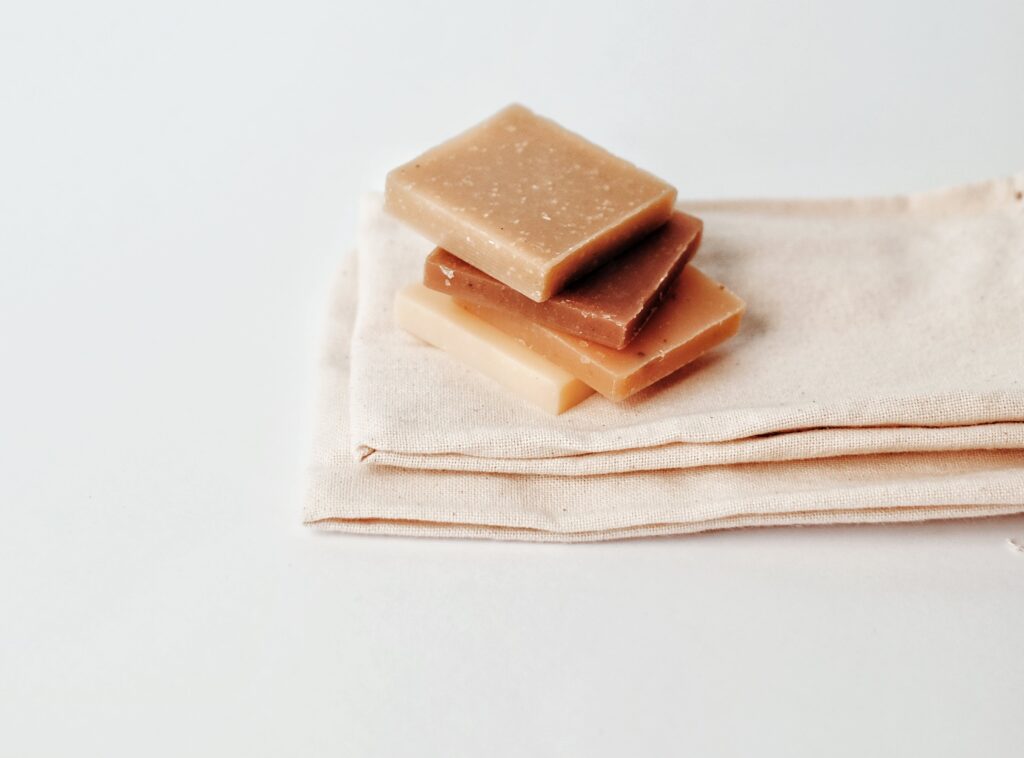
Several factors can contribute to dry skin. Common causes include:
- Overwashing: Washing your skin too frequently can strip it of its natural oils, which can lead to dryness. Try to limit your showers or baths to once per day and use lukewarm water instead of hot.
- Harsh Soaps: Some soaps can be too harsh on your skin, causing it to dry out. Look for gentle, moisturizing soaps that are designed for dry skin.
- Dehydration: Not drinking enough water can cause your skin to become dehydrated, leading to dryness. Aim to drink at least eight glasses of water per day.
- Low Humidity: Dry air can also cause your skin to become dry. This is especially common during the winter months when the air is drier. Use a humidifier to add moisture back into the air.
- Sun Exposure: Overexposure to the sun can damage your skin and cause it to become dry. Always wear sunscreen and avoid prolonged exposure to the sun.
- Medications: Certain medications can cause dry skin as a side effect. If you are experiencing dry skin and are taking medication, speak with your doctor to see if there is an alternative medication that you can take.
- Age: As we age, our skin becomes thinner and less elastic, which can lead to dryness. Using a moisturizer regularly can help combat this.
- Smoking: Smoking can cause your skin to become dry and dull. Quitting smoking can help improve the overall health of your skin.
- Alcohol: Drinking alcohol can dehydrate your skin, causing it to become dry. Try to limit your alcohol intake, and drink plenty of water to combat the effects.
- Hot Showers: Hot showers can feel great, but they can also cause your skin to become dry. Try to take lukewarm showers instead.
- Stress: Stress can cause your body to produce cortisol, which can lead to dry skin. Try to manage your stress levels by practicing relaxation techniques such as yoga or meditation.
- Poor Diet: Eating a diet that is high in processed foods and low in nutrients can lead to dry skin. Be sure to eat a balanced diet that is rich in vitamins and minerals.
- Genetics: Some people are simply more prone to dry skin due to their genetics. If you have a family history of dry skin, you may need to take extra steps to keep your skin moisturized.
- Medical Conditions: Certain medical conditions such as eczema, psoriasis, and thyroid disorders can cause dry skin. If you are experiencing dry skin and are concerned, speak with your doctor.
- Environmental Factors: Exposure to harsh chemicals, such as those found in cleaning products or beauty products, can cause dry skin. Be sure to use gentle, natural products whenever possible.
6. DOES RELYING ON SUNSCREEN ALONE SUFFICE TO MAINTAIN SKIN HYDRATION?

While sunscreen is crucial for protecting your skin from harmful UV rays and preventing sun damage, it is not designed to provide hydration. Sunscreen’s primary function is to create a protective barrier on the skin, shielding it from the sun’s ultraviolet (UV) radiation and helping prevent sunburn, premature aging, and skin cancer.
Hydration is a separate aspect of skin care that involves maintaining the skin’s moisture content. To keep your skin adequately hydrated, especially in challenging environmental conditions, it’s essential to incorporate a moisturizer into your skincare routine. Here’s why:
Prevents Dryness:
- Moisturizers are formulated to hydrate the skin by trapping and retaining moisture. They create a barrier that helps prevent water loss, keeping the skin supple and preventing dryness.
Restores Moisture Balance:
- Environmental factors such as low humidity, exposure to hot or cold temperatures, and wind can strip the skin of its natural oils, leading to dryness. Moisturizers replenish these oils, restoring the skin’s moisture balance.
Improves Skin Texture:
- Well-hydrated skin is smoother and more pliable. Moisturizers contribute to improved skin texture, reducing the appearance of fine lines and creating a more youthful complexion.
Enhances Skin Barrier:
- A healthy skin barrier is crucial for protecting against environmental stressors and maintaining moisture. Moisturizers help reinforce this barrier, promoting overall skin health.
Suitable for All Skin Types:
- While sunscreen is vital for everyone, moisturizers are suitable for all skin types. Whether you have oily, dry, or sensitive skin, there are moisturizers tailored to address specific needs and concerns.
For an effective skincare routine, especially in the daytime, consider applying sunscreen followed by a moisturizer. This combination provides comprehensive protection, with sunscreen shielding against UV rays and the moisturizer maintaining skin hydration.
Remember to choose a moisturizer that suits your skin type and addresses any specific concerns you may have, such as anti-aging properties, sensitivity, or oil control. By combining sunscreen and a suitable moisturizer, you create a robust defense against environmental elements, promoting healthy and well-hydrated skin.
7. HOW TO TACKLE SKIN THAT IS PEELING AND SUNBURNED DUE TO DRYNESS?
Dealing with dry skin that’s peeling and sunburned requires a gentle and nourishing approach to promote healing and restore moisture. Here’s a step-by-step guide to help alleviate discomfort and support the recovery of sunburned, peeling skin:
Cool Compress:
- Start by applying a cool compress to the affected areas. Use a clean cloth soaked in cool water and gently place it on the sunburned and peeling skin. Avoid using ice directly on the skin, as it can further irritate the area.
Hydrate from Within:
- Drink plenty of water to stay well-hydrated. Proper hydration supports the body’s natural healing processes and helps replenish lost fluids due to sun exposure.
Aloe Vera Gel:
- Aloe vera is well-known for its soothing and healing properties. Apply pure aloe vera gel to the sunburned areas. The cool sensation can provide relief, and aloe vera’s anti-inflammatory properties may help reduce redness and irritation.
Moisturize:
- Use a gentle, fragrance-free moisturizer to hydrate the affected skin. Choose a product with ingredients like hyaluronic acid, glycerin, or ceramides to help lock in moisture. Apply the moisturizer several times a day, especially after bathing.
Avoid Harsh Products:
- Steer clear of harsh skincare products, including those containing alcohol, retinoids, and strong fragrances. These can further irritate sunburned skin and impede the healing process.
Oatmeal Bath:
- Consider taking a cool bath with colloidal oatmeal or adding oatmeal to the bathwater. Oatmeal has anti-inflammatory properties and can help soothe irritated skin.
Over-the-Counter Pain Relievers:
- If you’re experiencing discomfort, over-the-counter pain relievers like ibuprofen or acetaminophen can help reduce pain and inflammation. Follow the recommended dosage.
Protect from Further Sun Exposure:
- While your skin is healing, it’s crucial to protect it from additional sun exposure. Wear loose, protective clothing, and use a broad-spectrum sunscreen with a high SPF on exposed areas. Reapply sunscreen every two hours or more frequently if swimming or sweating.
Avoid Peeling or Picking:
- Resist the temptation to peel or pick at sunburned and peeling skin. This can increase the risk of infection and prolong the healing process. Let the skin shed naturally.
Humidify the Air:
- If you’re indoors, use a humidifier to add moisture to the air. This can prevent the skin from becoming too dry, especially in air-conditioned environments.
Consult a Healthcare Professional:
- If the sunburn is severe, causing blisters, and intense pain, or if there are signs of infection, seek medical attention promptly.
Remember that healing from sunburn takes time, and it’s essential to be patient. Taking these steps can help alleviate discomfort, promote healing, and restore moisture to sunburned, peeling skin. If symptoms persist or worsen, consult with a healthcare professional for personalized advice.
8. DO RATIATORS AND HEATING SYSTEMS PLAY A ROLE IN CAUSING DRY SKIN?
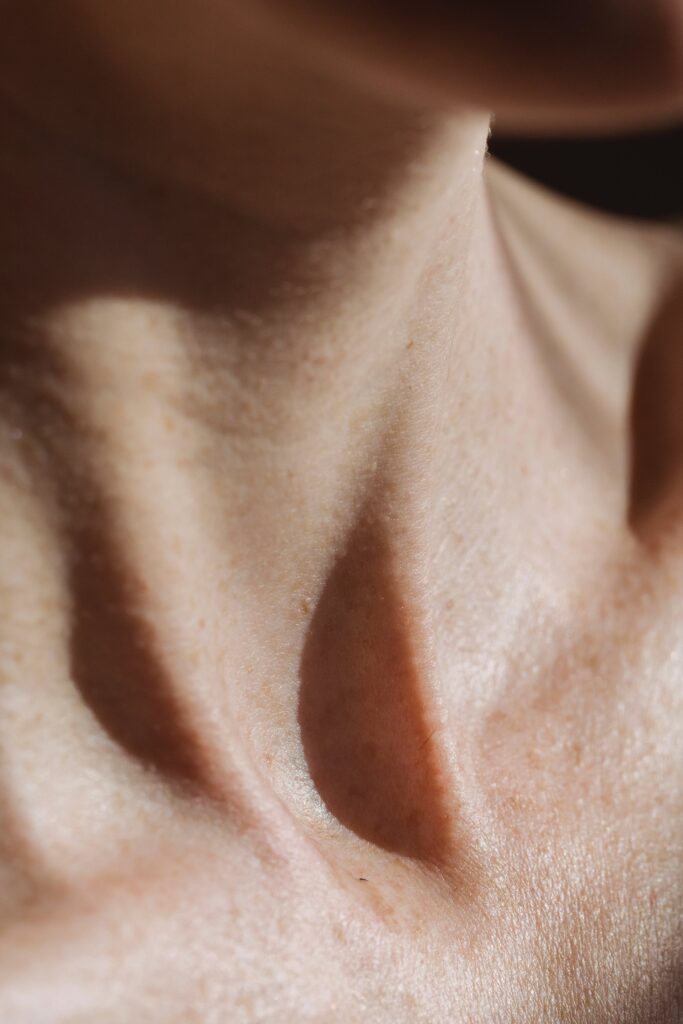
Yes, radiators and heating systems can contribute to dry skin. The process of heating indoor spaces often leads to a decrease in humidity levels, and low humidity can have a drying effect on the skin. Here’s how radiators and heating systems may contribute to dry skin:
Reduced Humidity:
- Heating systems, especially during the winter months, can significantly reduce the humidity in indoor environments. As the air becomes drier, it has the potential to draw moisture from the skin, leading to dryness.
Dehydration:
- Dry air can contribute to dehydration, affecting not only the skin but also the body as a whole. Dehydrated skin is more prone to dryness, flakiness, and irritation.
Skin Barrier Disruption:
- Prolonged exposure to dry air can compromise the skin’s natural barrier function. This barrier is essential for retaining moisture and protecting the skin from external irritants. When disrupted, it can lead to increased water loss and dry skin.
Eczema and Irritation:
- Individuals with conditions like eczema may experience exacerbated symptoms when exposed to dry air from heating systems. The lack of moisture can trigger or worsen skin irritation in those with sensitive skin conditions.
To mitigate the impact of radiators and heating systems on your skin, consider the following tips:
Use a Humidifier:
- Adding a humidifier to your indoor space can help maintain optimal humidity levels. Humidifiers release moisture into the air, counteracting the drying effect of heating systems.
Stay Hydrated:
- Drink plenty of water to stay hydrated from within. Hydrated skin is better equipped to withstand the drying effects of low humidity.
Moisturize Regularly:
- Establish a consistent moisturizing routine to keep your skin hydrated. Use a moisturizer that suits your skin type, and apply it after bathing and as needed throughout the day.
Avoid Hot Showers:
- While it might be tempting to take hot showers during colder seasons, hot water can strip the skin of its natural oils. Opt for lukewarm showers and limit their duration to prevent excessive drying.
Protect Your Skin:
- Wear protective clothing, such as long sleeves and gloves, to shield your skin from direct exposure to dry air. This is particularly important when spending extended periods in heated environments.
By incorporating these practices, you can help maintain your skin’s moisture balance and reduce the likelihood of dryness caused by indoor heating systems. If dry skin persists or becomes severe, consider consulting with a dermatologist for personalized advice and treatment.
9. WHAT CONSTITUTES EFFECTIVE CARE FOR DRY SKIN?
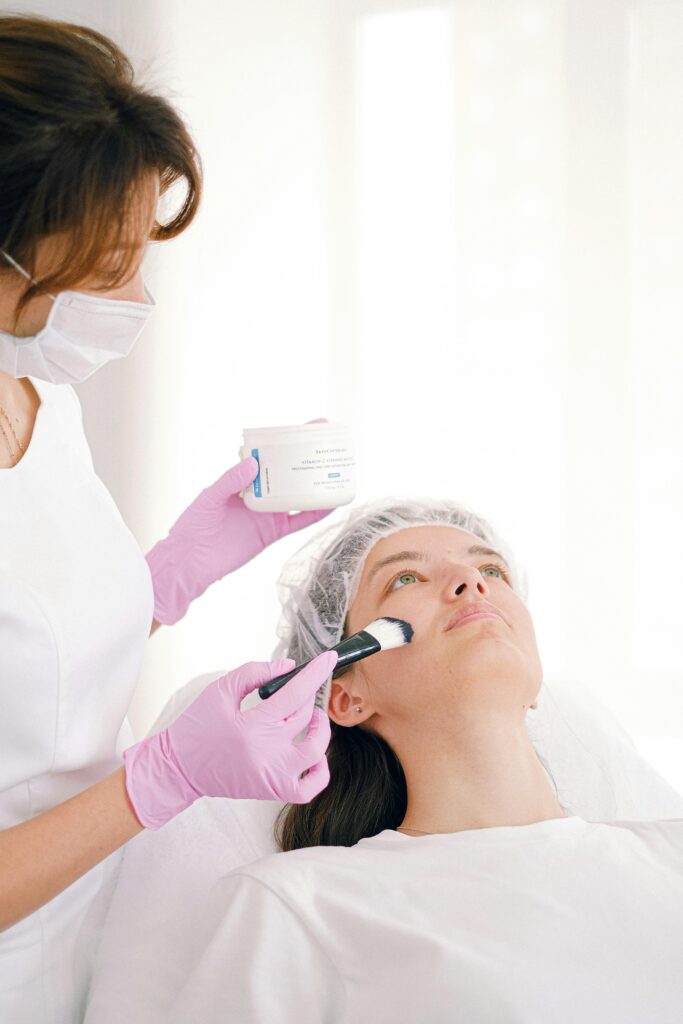
Effective care for dry skin involves a combination of skincare practices, lifestyle adjustments, and the use of suitable products. Here are key strategies to help alleviate and prevent dry skin:
Gentle Cleansing:
- Use a mild, fragrance-free cleanser to avoid stripping your skin of natural oils. Avoid hot water, and opt for lukewarm water while cleansing to prevent further drying.
Hydrate from Within:
- Drink an adequate amount of water throughout the day to maintain overall hydration. Proper hydration from within contributes to the health and moisture balance of your skin.
Moisturize Regularly:
- Apply a rich and nourishing moisturizer, preferably one containing ingredients like hyaluronic acid, glycerin, shea butter, or ceramides. Moisturize after bathing and whenever your skin feels dry.
Use a Humidifier:
- In dry or heated environments, especially during the winter, consider using a humidifier to add moisture to the air. This helps prevent excessive drying of the skin.
Avoid Harsh Products:
- Choose skincare products that are free of alcohol, strong fragrances, and other harsh chemicals. These can irritate and further dry out your skin.
Limit Shower Time:
- Limit your time in the shower and avoid hot water. Long, hot showers can strip the skin of its natural oils, contributing to dryness. Aim for shorter, lukewarm showers.
Exfoliate Gently:
- Exfoliation can help remove dead skin cells, but it should be done gently to avoid irritation. Use a mild exfoliant once or twice a week to promote smoother skin.
Protect from UV Rays:
- Always use sunscreen with at least SPF 30 when going outdoors. Sun exposure can contribute to skin dryness and premature aging. Reapply sunscreen every two hours or more frequently if swimming or sweating.
Choose Skin-Friendly Fabrics:
- Wear soft, breathable fabrics like cotton, especially if you have dry or sensitive skin. Harsh fabrics can exacerbate irritation.
Adjust Skincare for the Season:
- Your skincare routine may need adjustments based on the season. In colder months, use thicker moisturizers, and in warmer months, lighter formulations may be sufficient.
Consider Overnight Treatments:
- Apply a hydrating mask or a thicker moisturizer as an overnight treatment to provide intense hydration while you sleep.
Diet Rich in Healthy Fats:
- Include foods rich in omega-3 fatty acids, such as fatty fish, flaxseeds, and walnuts, in your diet. These fats contribute to skin health and moisture.
Consult a Dermatologist:
- If your dry skin persists or is severe, consider consulting with a dermatologist. They can provide personalized advice and recommend specific products or treatments tailored to your skin’s needs.
By incorporating these practices into your daily routine, you can effectively care for dry skin and promote a healthier, more hydrated complexion. Consistency and patience are key as it may take some time to see significant improvements.
10. DOES DRINKING WATER HELP DRY SKIN?
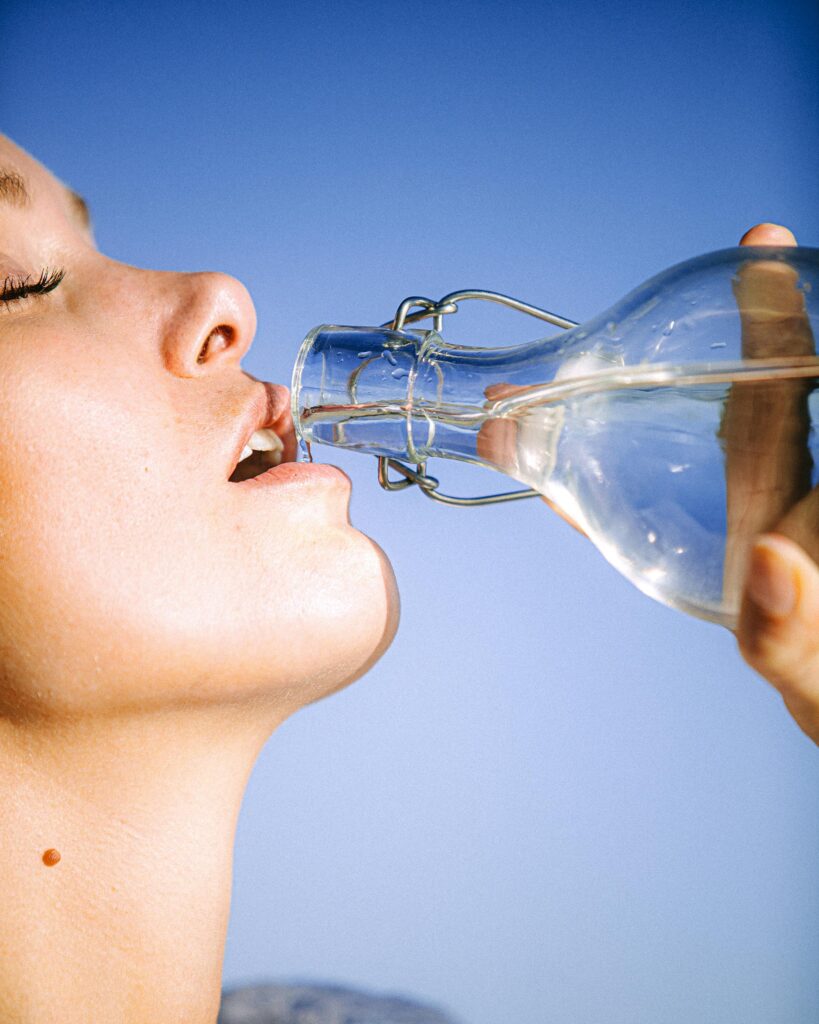
Yes, staying well-hydrated by drinking an adequate amount of water can be beneficial for addressing dry skin. Water is essential for overall health, and proper hydration is reflected in the health and appearance of the skin. When the body is well-hydrated, it helps maintain the skin’s moisture balance and supports its natural functions.
While drinking water is a valuable part of skincare, it’s important to note that hydration involves a combination of internal and external factors. In addition to staying hydrated from within, using a suitable moisturizer, avoiding harsh skincare products, and considering environmental factors like humidity can contribute to maintaining healthy and hydrated skin.
Remember that individual hydration needs may vary, and factors such as climate, physical activity, and overall health can influence how much water your body requires. It’s always a good idea to consult with a healthcare professional for personalized advice based on your specific needs and circumstances.
11. WHAT TYPES OF PRODUCTS SHOULD I USE FOR DRY SKIN?
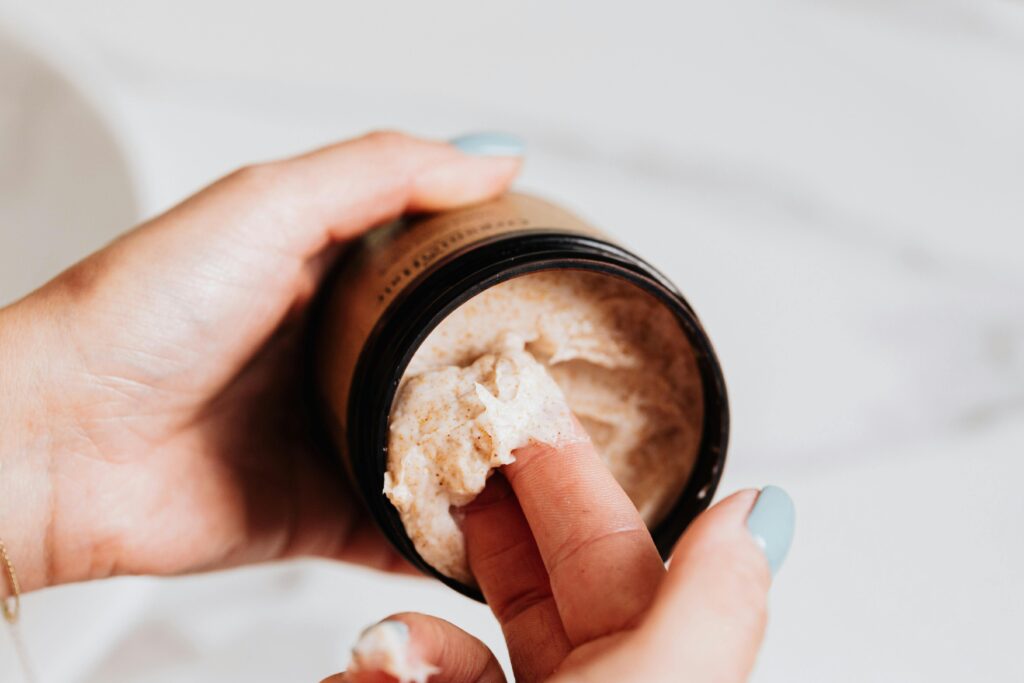
Choosing the right products for dry or sensitive skin involves opting for gentle, hydrating formulations that nourish and soothe the skin. Here are some recommendations for products suitable for dry or sensitive skin:
Cleanser:
- Gentle, Fragrance-Free Cleanser: Choose a mild, fragrance-free cleanser that is specifically formulated for sensitive skin. Look for ingredients like glycerin or hyaluronic acid for added hydration.
Moisturizer:
- Hypoallergenic Moisturizer: A hypoallergenic moisturizer free from fragrances, dyes, and harsh chemicals. To lock in moisture, look for ingredients like ceramides, shea butter, or glycerin.
- Creams or Ointments: Thicker creams or ointments are often more hydrating for dry skin, providing a protective barrier. Consider using these formulations, especially in drier climates or during the night.
Sunscreen:
- Broad-Spectrum Sunscreen: Use a broad-spectrum sunscreen with at least SPF 30 to protect your skin from harmful UV rays. Choose a sunscreen formulated for sensitive skin and free from potential irritants.
Exfoliant:
- Gentle Exfoliant: If you choose to exfoliate, opt for a gentle exfoliant with mild ingredients like alpha hydroxy acids (AHAs) or beta hydroxy acids (BHAs). Use it once or twice a week to avoid over-exfoliation.
Serums:
- Hyaluronic Acid Serum: Hyaluronic acid attracts and retains moisture, making it an excellent choice for hydrating sensitive skin.
- Calming Serums: Look for serums containing calming ingredients such as chamomile, aloe vera, or calendula to soothe sensitive skin.
Makeup Remover:
- Gentle Makeup Remover: Choose a gentle, fragrance-free makeup remover to effectively cleanse your skin without irritating it.
Body Wash:
- Fragrance-Free Body Wash: Use a mild, fragrance-free body wash to avoid stripping the skin of its natural oils. Look for hydrating ingredients like aloe vera or glycerin.
Face Masks:
- Hydrating Masks: Incorporate hydrating masks with ingredients like hyaluronic acid or aloe vera into your skincare routine for an extra boost of moisture.
Lip Balm:
- Hydrating Lip Balm: Use a hydrating lip balm with ingredients like shea butter or coconut oil to keep your lips moisturized.
Laundry Detergent:
- Hypoallergenic Laundry Detergent: Consider using a hypoallergenic laundry detergent, especially for clothes that come in direct contact with your skin.
When introducing new products, perform patch tests to ensure that they do not cause any adverse reactions. It’s advisable to consult with a dermatologist, especially if you have specific skin concerns or conditions. They can provide personalized recommendations based on your skin’s needs and sensitivities.
12. HOW CAN I PRESERVE THE NATURAL MOISTURE OF MY SKIN?
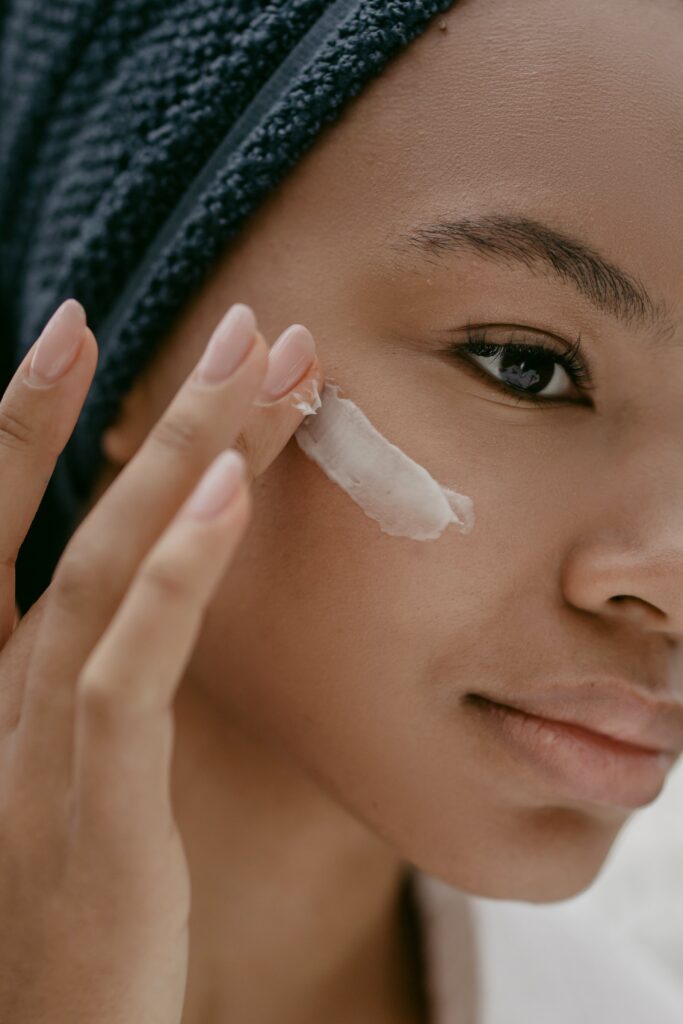
Retaining your natural skin moisture involves adopting a comprehensive skincare routine and making lifestyle choices that support hydration. Here are some tips to help you maintain and enhance your skin’s natural moisture:
Hydrate from Within:
- Drink an adequate amount of water throughout the day. Staying well-hydrated supports overall skin health.
Moisturize Regularly:
- Use a high-quality moisturizer suitable for your skin type. Apply it after cleansing to lock in moisture.
Choose the Right Products:
- Opt for skincare products with hydrating ingredients such as hyaluronic acid, glycerin, and ceramides.
- Avoid products containing harsh chemicals, alcohol, and fragrances that can strip your skin of natural oils.
Use a Humidifier:
- In dry or heated environments, especially during winter, use a humidifier to add moisture to the air. This can prevent your skin from drying out.
Limit Shower Time:
- Take shorter showers with lukewarm water. Hot water can strip the skin of its natural oils, leading to dryness.
Use Gentle Cleansers:
- Choose mild, fragrance-free cleansers to avoid irritation. Harsh cleansers can disrupt the skin’s moisture barrier.
Pat Dry, Don’t Rub:
- After washing your face or showering, pat your skin dry with a soft towel instead of rubbing. This helps to retain moisture.
Apply Moisturizer on Damp Skin:
- Apply your moisturizer while your skin is still slightly damp. This helps lock in moisture and enhances absorption.
Protect Your Skin from the Sun:
Use sunscreen with at least SPF 30 to protect your skin from harmful UV rays. Sun damage can contribute to dryness and premature aging.
Exfoliate Gently:
Incorporate exfoliation into your routine to remove dead skin cells. Use a gentle exfoliant once or twice a week to avoid over-exfoliation.
Healthy Diet:
- Consume a diet rich in fruits, vegetables, and foods containing omega-3 fatty acids. These nutrients contribute to skin health and hydration.
Avoid Smoking and Excessive Alcohol:
- Smoking and excessive alcohol consumption can dehydrate the skin. Avoiding these habits can help maintain natural moisture.
Manage Stress:
- Chronic stress can affect your skin’s health. Practice stress-reducing activities like meditation, yoga, or deep breathing to support overall well-being.
Get Adequate Sleep:
- Ensure you get enough sleep each night. Quality sleep is essential for skin regeneration and maintaining moisture balance.
Consult a Dermatologist:
- If you have persistent skin concerns or conditions, consult with a dermatologist. They can provide personalized advice and recommend specific treatments or products tailored to your skin’s needs.
Consistency is key when it comes to maintaining natural skin moisture. By incorporating these tips into your daily routine, you can support a hydrated, healthy complexion.
Thanks_
Regards, Shania
We have suggested some related good products below that may relieve your dry skin.
Top Pick Below
If you buy product from our Top pick we earn little commission.
Moisturizing Cream
Body and Face Moisturizer for Dry Skin
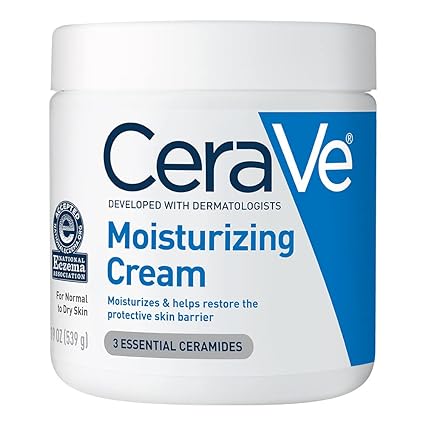
- [ HYALURONIC ACID MOISTURIZER ] With hyaluronic acid, ceramides and MVE technology for 24 hour hydration. Rich, velvety texture that leaves skin feeling smooth, it is absorbed quickly for softened skin without greasy, sticky, feel.
- [ MOISTURIZER FOR DRY SKIN ] A deficiency of ceramides in skin can often be associated with dry skin, which can feel itchy and look flaky. CeraVe Moisturizing Cream is formulated with three essential ceramides & hyaluronic acid.
- [ GENTLE DAILY MOISTURIZER ] For face and body or can be used as a hand cream for dry skin relief. Holds National Eczema Association (NEA) Seal of Acceptance. Fragrance free, paraben free, allergy-tested, and non-comedogenic.
- [ 3 ESSENTIAL CERAMIDES ] Ceramides are found naturally in the skin and make up 50% of the lipids in the skin barrier. All CeraVe products are formulated with three essential ceramides (1, 3, 6-II) to help maintain the skin’s natural barrier.
- [ DEVELOPED WITH DERMATOLOGISTS ] CeraVe Skincare is developed with dermatologists and has products suitable for dry skin, sensitive skin, oily skin, acne-prone, and more.
Ultra Healing Lotion
Hand and Body Moisturizer for Extra Dry Skin
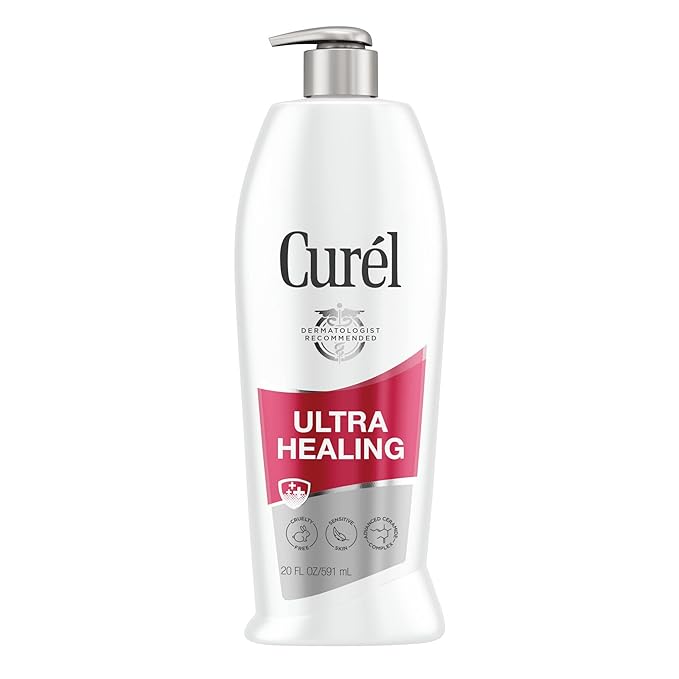
- DRY SKIN RELIEF – Clinically proven to relieve and repair extra-dry skin 2 times better than the leading intensive lotion
- ALL DAY MOISTURIZER – Provides instant dry skin relief that lasts for over 24 hours
- RESTORE MOISTURE – Contains extra-strength, naturally hydrating agents to help even the driest, tightest skin feel soft, supple and restored
- NON GREASY MOISTURIZER – Non-greasy formula absorbs quickly and won’t clog pores
- SKIN REPAIR – With Advanced Ceramide Complex, the lotion restores skin’s ceramide levels to help retain moisture and prevent symptoms of dry, tight skin from returning
Hand & Body Lotion
Lubriderm Advanced Therapy Fragrance Free Moisturizing Hand & Body Lotion
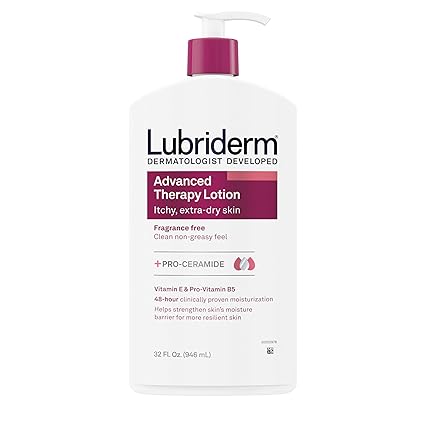
- 32-fluid ounce bottle of Lubriderm Advanced Therapy Fragrance-Free Daily Moisturizing Lotion + Pro-Ceramide with Vitamin E and Pro-Vitamin B5 itchy, extra-dry skin to help strengthen skin’s moisture barrier
- Specially designed unscented lotion intensely hydrates itchy, extra-dry skin. The soothing formula of the body lotion with Pro-Ceramide penetrates within skin’s surface to deliver 48-hour clinically proven moisturization
- Body lotion is formulated with vitamins E and Pro-Vitamin B5 which moisturizes to help strengthen skin’s moisture barrier. The non-greasy lotion transforms itchy, extra-dry skin into healthier looking, more resilient skin
- Clinically- and dermatologist-tested lotion is hypoallergenic and fragrance free. The daily hand and body moisturizer suitable for sensitive skin is formulated free of parabens, phthalates and dyes
- Lubriderm, a dermatologist developed, advanced therapy lotion absorbs quickly and leaves a clean, non-greasy feel. To use, smooth on hands and body daily or as directed by a physician
Body Moisturizer
Hydrating Moisturizing Cream for Dry Skin
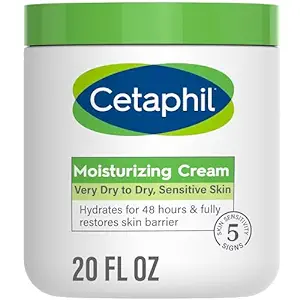
- CETAPHIL BODY MOISTURIZING CREAM FOR DRY TO VERY DRY SKIN: Instantly replenishes, intensely nourishes and soothes skin dryness for 48 hours
- CLINICALLY PROVEN TO RESTORE SKIN’S MOISTURE BARRIER IN 1 WEEK: Binds water to the skin, preventing moisture loss to hydrate and protect skin from dryness
- NEW AND IMPROVED INGREDIENT BLEND: Now with hydrating glycerin and skin essential vitamins B5 (panthenol) and B3 (niacinamide)
- DEVELOPED FOR EVEN THE MOST SENSITIVE SKIN: The hypoallergenic, non-comedogenic formula is free of fragrances, parabens and sulfates
- DERMATOLOGIST RECOMMENDED for Sensitive Skin


